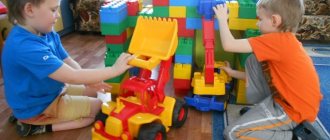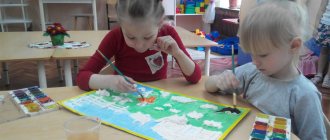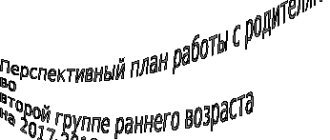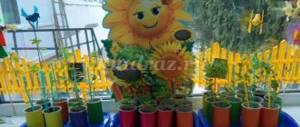Forms and methods of working with parents in institutions of additional education for children
Maria Sharapova
Forms and methods of working with parents in institutions of additional education for children
The system of additional education is of great importance in the development of a child’s personality, creative abilities, and individual abilities. Additional education does not set itself the task of training professionals, but is focused on the comprehensive development of the child. Family is one of the greatest values created by humanity in the entire history of its existence. A strong and durable family is the key to the formation of a harmonious personality. The role of the family is to satisfy human needs, not only in material, physical terms, but also spiritually. additional education are combined in the process of intellectual, cultural, and healthy development of children .
Working with parents in an additional education institution for children is one of the areas of work of the teacher organizer. And also interaction with parents is an urgent task for teachers. Not only to properly train , educate, and develop children , but also to equip parents . Close cooperation is expected when working with parents It’s true that well-structured work with parents allows us to make the educational process more interesting, eventful, productive and memorable with pleasant events. The main objectives of this work are :
• involving parents in the educational process of the institution ;
• holding joint holidays and entertainment;
• participation in joint competitions, exhibitions and competitions;
• creating an atmosphere of common interests and emotional support;
• encouraging children for their achievements
In modern pedagogy, there are many forms and methods of working with parents . These forms include traditional ones ( parent meetings , consultations, testing, individual conversations, etc.). Non-traditional (meetings, trainings, master classes, shows, competitions, etc.)
.
Interaction with his family allows the teacher to get to know the child better. And for parents, involvement in the educational process provides such advantages as:
• Active position in the child’s life
• Willingness to interact with the teacher to combine efforts for the development and upbringing of the child
• Enriching the experience of interpersonal communication of children , parents , teachers
• Parental expectations and ideas
How well parents can listen and understand their child what he really wants to say determines the effectiveness of communication. Spending parents and children. An interesting form of work is joint events for parents and children in the form of competitions , games, trainings, and holiday concerts. Such events are often timed to coincide with traditional holidays (Mother’s Day, New Year, etc.)
or on the initiative of the teacher
(friendship holiday, smile day, etc.)
. These events:
• strengthen family relationships,
• create a positive emotional mood,
• develop team spirit,
• form group unity , cohesion.
A joint festive event for children and mothers dedicated to Mother’s Day creates a respectful attitude towards your family, your mother; contributes to the formation of cohesion between children and parents ; creates a warm climate between mothers and children. During this event, joint leisure time for parents and children . Parents can evaluate the results of extracurricular activities.
How to involve a dad in raising his own child?
It is important for a child to observe the behavior pattern of the entire family every day. Often, dads spend much less time with their children than moms. That is why the teacher-organizer, in his work with parents, organizes events in which all family members will be involved. This form of work differs from a festive event in a large number of joint tasks and specially selected exercises . Using the example of the sports event “Dad, Mom, Me – a Sports Family”
Let's look at this
form . One of the main goals of such events is to show parents the child’s abilities in a team, his leadership qualities, and the development of sports and motor skills. This will be much more effective than simply telling the parent about the child's problems . These events are no less important for children , because they allow the child to see their parents in an unusual creative, competitive position and without the usual parental role . Also joint education of physical culture and moral cohesion of the family. For the teacher-organizer, such events are an opportunity to involve parents in cooperation in preserving and strengthening the health of children .
Individual forms of work between teachers and parents in additional education institutions are carried out to clarify parental . During individual consultations, parents are increasingly willing to talk about the worries and fears that worry them. Such individual conversations are carried out on the initiative of the teacher or on the initiative of the parent . Work also takes place and tests. This form of work may or may not be anonymous. Next, the teacher conducts diagnostics and summarizes the survey results. Most modern parents are concerned with the following questions:
• The influence of computer games on the development of a child’s personality
• Computer addiction
• Child’s leisure time at home
• The importance of additional education on the development of a child
• Determining the child's abilities
• “Teaching a child to communicate”
and etc.
The visual information that the teacher prepares when working with parents very diverse . In our modern world, a teacher can communicate and share information and achievements with parents via the Internet . Official websites for additional education , where every parent can find the information .
For the teacher organizer, the main goal still remains verbal communication and interaction with parents . Therefore, the teacher-organizer organizes thematic exhibitions, decorative exhibitions, fine art exhibitions information . So that parents have the opportunity to see their children’s work and joint work .
The originality of the presentation of information by the teacher-organizer in various forms of work with parents . Diversity and frequent changes of headings throughout the academic year. Small amounts of text. A large amount of information will not make a parent to delve into the material after work . Use more illustrations and photographs.
The forms of work used by the teacher will contribute to:
• Increasing the importance of additional education . Additional education will appear as an important condition for the development of the child and his professional orientation;
• Expanding access to information about the additional services offered , in accordance with the age and abilities of the child.
Family and additional education institutions: facets of cooperation (from work experience)
Bibliographic description:
Vorobyova, Yu. Yu. Family and the institution of additional education: facets of cooperation (from work experience) / Yu. Yu. Vorobyova, E. G. Tkachenko, S. V. Khomchenko. — Text: direct // Education and upbringing. — 2020. — No. 1 (21). — P. 34-38. — URL: https://moluch.ru/th/4/archive/114/3893/ (access date: 10.10.2020).
Modern parents consider the institution of additional education for children not only as a place for developing a child’s hobbies and organizing his leisure time, but also, above all, are interested in the child’s educational success and are aimed at a clear and intelligible educational result.
Therefore, it is very important for a teacher of additional education to establish partnerships with parents, create an atmosphere of support and community of interests, mutual understanding, cooperation and interaction
Experience shows: “The most difficult thing in working with children is working with their parents”
The specificity of the Municipal Educational Establishment of the Children's Creativity House, as well as all institutions of additional education, is to fulfill the state order for the socialization of children, to promote their spiritual and moral development, to create additional prerequisites and unique opportunities for the upbringing, intellectual and creative development of children with active inclusion into this family process.
A competent combination of new and traditional forms of work with parents makes it possible to increase the efficiency of the educational process, strengthens the connection between parents and children, and increases children’s ability and activity for cooperation and creative self-expression.
Therefore, in order to improve the professional competence of teachers in the field of organizing interaction with parents, the House of Creativity holds pedagogical councils and methodological associations, where we try to use active forms of learning, as well as the exchange of experience between teachers.
Focusing on the variety of forms of communication with parents, as well as on their teaching experience, intuition and creative approach, teachers involve parents in the educational space of the institution.
Mandatory are information-analytical and visual-information forms:
– questionnaires, surveys, reviews, etc.
– information brochures, stands, open days, open classes for parents, etc.
Parents are in demand as visual information material for recordings of concerts, children's parties, and films about the lives of children in the Children's Art Center.
Also, recently, with the active introduction of interactive forms of communication, administration and teachers began to use Internet resources that highlight the activities of institutions and associations. The form of online consultations has become effective.
Parents are attracted by: an information stand “Parents for you”, photo showcases, photo collages, exhibition stands of works by gifted children.
For example, teacher Sivak Vera Tomovna of the “Color World” association introduces the achievements of her students by organizing their personal exhibitions. There were eight such exhibitions in the 2017–2018 academic year.
The creative project “Seasons”, which runs in the stained glass windows on the 1st floor, is popular with parents at the beginning of the school year; all associations of the arts and crafts department take part in it. Demonstration of students' creative achievements gives parents the opportunity to choose associations and teachers for their children's creative activities and get acquainted with their results.
Traditionally, every year, during the spring holidays, thematic exhibitions of arts and crafts are organized. Many parents are always present at the grand opening. The result of the joint work of the teacher and children always pleases parents, as evidenced by the “Book of Reviews and Impressions,” in which you can find the following lines:
- “Thank you for our children”
– “I’m glad to see my daughter happy from creativity in your
- “Thank you so much that there is such a House of Children’s Creativity, thank you to everyone.”
“Thank you to the teachers for teaching our children to create such beauty, the child is happy that he is studying in the House of Creativity.”
Such high results in the activities of teachers and the quality of creative works of children cannot be achieved without the moral and material support of parents.
We all understand that parents are not obliged to finance the educational process, but with a competent approach from teachers to resolving this problem, this issue can be resolved.
So:
– in SHRER - office supplies are purchased;
– in the DPT department - materials for the manufacture of creative products;
– in dance, choral and pop groups - costumes are made for concert performances, funds are found for participation in competitions and festivals;
– in the physical education and sports department - means for traveling to competitions;
– in the tourism and local history department - funds for the purchase of sports equipment.
It is when parents see the results of their children’s education at concerts, exhibitions, and competitions that they are ready to provide financial support to the institution.
Parent meetings remain the traditional form of work in the institution, but the content of their holding is changing.
Teachers are replacing parent meetings with a more interesting form of communication: “Oral Journal”, “Parent Ring”, “Tea Lounges”, where parents, tired after a hard day, perceive information from the teacher differently. At such meetings, parents’ attention to the creative activities of children is activated, conditions are created for conducting a friendly, frank dialogue between all participants in the educational process.
An example of such a meeting is the final event at the end of the school year by Irina Yuryevna Barinova, teacher of the “Handiwomen” association - the “Living Room for Parents” holiday.
Students gather with their parents in the hall.
In the first part of the “Our Successes” holiday, the teacher sums up the year on a positive note. Demonstrates presentations of classes, events, exhibitions. To the accompaniment of solemn music, he presents certificates to children for their determination, efficiency, creative approach to work and high achievements. Letters of gratitude to parents for cooperation and mutual understanding, for a conscientious attitude towards raising children, from the administration of the institution. Students demonstrate on stage the clothing models they present at city and inter-district competitions.
A modern teacher is always looking for new interesting facets of cooperation with the family. Therefore, each department of the House of Creativity chooses for itself the most effective forms of communication with parents.
In the music and choir studio, “Parental meetings” held on New Year’s Eve are popular.
At the decorated Christmas tree, children give musical New Year's gifts to their parents, and younger children give drawings and crafts. The meeting continues at the festive table, with songs, games and competitions.
At the school of early aesthetic development, multifaceted work is carried out, which includes, in addition to individual, visual and informational forms, collective ones.
Leisure activities in working with parents today are the most popular, in demand, attractive and useful. This:
– competitive game programs: “Call of the Jungle”, “Indian Day”, “School for Young Speakers”, “Pirate Party”, etc.;
– participation in the following campaigns: “Help the wintering bird”, “In the headlights”;
– involving parents in joint activities in “Creative Workshops”.
In the physical education and sports department, in order to improve the professional level and sports skills of students, parents are involved in competitive activities, both in its organization and directly in participation in competitions.
For example, in the “Chess” association, teacher Nikolai Yuryevich Krivtsov invites parents to play logic games, chess and checkers with their children at the end of the lesson, then do homework for children and adults. The result of such activities is the now traditional “Family Tournament”, where the winning families are identified and awarded with memorable diplomas and gifts.
A popular and sought-after form of working with parents in our institution is the organization and holding of mass leisure events: joint holidays, competitive game programs, concerts. There are a large number of them held throughout the year.
Organizing and holding holidays in the House of Creativity is joy, celebration, and fun that parents and children share. In November 2020, our cozy, small and beloved House celebrated its fiftieth anniversary and, of course, parents also took an active part in the preparation of this event.
The organization of leisure activities in the institution is carried out by the mass organizational department.
To help teachers organize active activities with children and parents, the department’s methodologists developed a Calendar of educational events at the Children’s Art House “Creativity Day by Day.”
This form of work with children, parents and teachers has been put into practice within two years.
The calendar covers nine academic months from September to May. It marks various international, all-Russian, professional, state and other holidays and events.
Every year, the most interesting, widespread and educationally important dates (one or two per month) are selected in the calendar, regulations are developed for holding these holidays, where students of all associations of the Children's Art House, teachers and, of course, parents become participants.
Depending on the activity and mass participation, associations receive a certain number of points. Based on the current rating, the “Best Association of the House of Creativity” is determined at the end of the year.
In the 2017–2018 academic year. year they became the School of Early Aesthetic Development and the Needlewoman association. And, of course, they achieved such results by working correctly with parents, actively involving them in joint activities with their children.
As part of the creative calendar, last year, with the participation of parents, a charity fair “Autumn Gifts” was held, all funds raised were sent to the development of the Zoo.
With the support of parents, students
– advertised their associations in the “We are the best!” campaign dedicated to Advertising Workers’ Day,
– gave warm hugs to loved ones and friends on “Hug Day”,
– wrote joint letters “with greetings” to other associations on World Greetings Day,
– became participants in the family photo exhibition “Cats for Kindness” dedicated to International Cat Day,
– remembered the importance of learning and preserving their native language,
– and became involved in many other interesting things.
This school year, a number of new, no less interesting, educational and relevant joint events with parents are planned, which will be timed to coincide with Internet Day in Russia, World Pet Day, International Cinema Day, Thank You Day, Poetry Day, Winter Sports Day and etc.
After all, the formation and development of human qualities: the ability to say “Thank you” to each other, take care of our little brothers, lead a healthy lifestyle, love Russian literature, help loved ones - happens in the family. And our task is to help parents with this.
Summarizing all of the above, I would like to note:
In our opinion, the House of Children's Creativity should not duplicate the activities of secondary educational institutions by holding mass parent training meetings and using traditional forms of working with them. We want to see parents not only as customers of the educational process, but also as partners. And partnership involves joint, first of all, creative activity of the teacher, children and their parents, creating an atmosphere of support and community of interests, mutual understanding, cooperation and interaction.
The DDT team understands that parents have entrusted us with their most valuable asset—their children.
And we try to justify their trust.
Key terms
(automatically generated)
: parent, children's creativity, child, teacher, Day, association, creative approach, traditional form of work, educational process, additional education.



